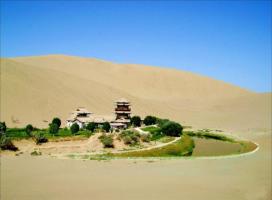'Belt and Road' Poised for Key Role in Driving Cultural Tourism
The 2015 Global Tourism Economy Forum (GTEF) kicked off in Macao on Monday with government leaders and industry experts immersed in three days of talks on how President Xi Jinping's "Belt and Road" initiative can assume the role in capitalizing on the transformation of cultural tourism.
Hosted by Macao's Secretariat for Social Affairs and Culture, this year's event is expected to promote an international dialogue on the theme "Belt and Road Initiative - Unleashing New Dynamics of Cultural Tourism", while intensifying links with Latin American countries.
In his opening address, Chief Executive of the Macao Special Administrative Region Chui Sai-on said the global tourism industry is currently facing immense opportunities and great challenges at the same time.
"We have to stand strong today with a clear vision of the future. Striving to combine forces across cultures, sectors and regions, we need to seize every golden opportunity and put it to good use," he said, adding that Macao, which is included in the "Belt and Road" strategy, can give play to its focal effect and be a part of regional cooperation.
Former Macao chief executive Ho Hau-wah, who is now a vice-chairman of the National Committee of the Chinese People's Political Consultative Conference, said the theme of this year's forum will facilitate discussions on the utilization of each country's abundant cultural resources to drive and deepen comprehensive economic cooperation and cultural exchanges between countries and regions to achieve mutual advantage. "Tourism is not only our country's strategic pillar industry. It's also a force capable of fusing invaluable ancient and modern social and cultural resources, and transforming them into economic activities that benefit people's livelihoods," Ho said.
The "Belt and Road" initiative, which was first proposed by Xi in 2013, is a trade and infrastructure network that includes the Silk Road Economic Belt and the 21st Century Maritime Silk Road. Its basic principle is equality and mutual benefit.
Taleb Rifai, secretary-general of the World Tourism Organization, told the gathering that Asia and the Pacific is one of the world's leading tourism regions led by the importance of China - both as a source market and tourism destination. And this year's forum is to bring Asia to the world and the world to Asia.
He said that the links between tourism and culture offer an immense opportunity to contribute to inclusive economic growth, social development and stability and heritage preservation. Both tourism and culture can advance the objectives of the "Belt and Road" initiative.
Cultural tourism fosters economic growth, while the responsible use of cultural assets for tourism creates new employment opportunities and generates income for local communities, and thus promotes social development and stability, Rifai said.
Li Jinzao, chairman of the China National Tourism Administration, called for more advanced infrastructure development connectivity along the "Belt and Road" countries, as connectivity is an important factor that will lift tourism growth.
In conjunction with this year's GTEF, China Daily and the China Chamber of Tourism will co-host a panel session for the fourth year running, bringing together distinguished academics, as well as experts from the business and travel sectors, to review the trends, opportunities and challenges in cultural tourism.
The dialogue, entitled "Exploring the Full Dimension of Cultural Tourism - Cultural Heritage and Creative Living Culture", will be held on Tuesday at the Venetian Hotel, Macao.














